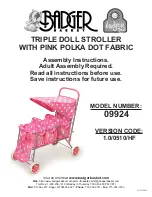
6 - 13
6 INSPECTION AND MAINTENANCE
6.6 Troubleshooting
This section describes the various types of trouble that occur when the system is
operated, and causes and corrective actions of these troubles.
6.6.1 Troubleshooting basics
The basic three points that must be followed in the troubleshooting are as follows.
(1) Visual inspection
Visually check the following.
(a) Movement of machine (stopped condition, operating condition)
(b) Power supply on/off
(c) Status of input/output devices
(d) Installation condition of the Motion controller, I/O module, Motion module,
intelligent function module, SSCNET cable, Synchronous encoder cable.
(e) State of wiring (I/O cables, cables)
(f) Display states of various types of indicators
• MODE LED, RUN LED, ERR. LED, BAT LED, 7-segment LED (Installation
mode, Operation mode, Battery error, STOP/RUN, etc.), etc.
(g) Status of setting of various types of switches (Setting of No. of stages of
extension base unit, power interrupt hold-on status).
After checking (a) to (g), monitor the operating conditions of servomotors and
error code using MT Developer2 and GX Developer.
(2) Check of trouble
Check to see how the operating condition varies while the Motion controller is
operated as follows.
(a) Set the RUN/STOP/RESET switch of Motion controller to STOP.
(b) Reset the trouble with the RUN/STOP/RESET switch of Motion controller.
(c) Turn ON and OFF the Motion controller’s power supply.
(3) Narrowing down the range of trouble occurrence causes
Estimate the troubled part in accordance with items (1) and (2) above.
(a) Motion controller or external devices
(b) Motion CPU area or PLC CPU area
(c) I/O module or others
(d) Servo program or Motion SFC program
(e) Sequence program
Summary of Contents for Q170MCPU
Page 1: ......
Page 19: ...A 18 MEMO ...
Page 81: ...2 54 2 SYSTEM CONFIGURATION MEMO ...
Page 135: ...5 10 5 START UP PROCEDURES MEMO ...
Page 171: ...7 6 7 POSITIONING DEDICATED SIGNALS MEMO ...
Page 225: ...APP 54 APPENDICES MEMO ...
Page 228: ......















































